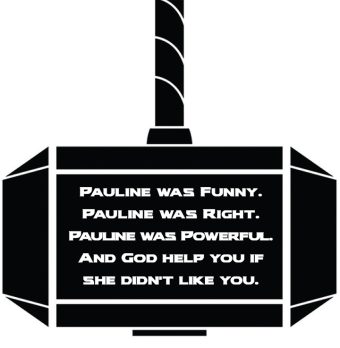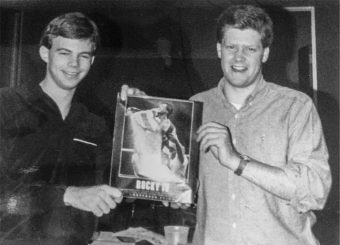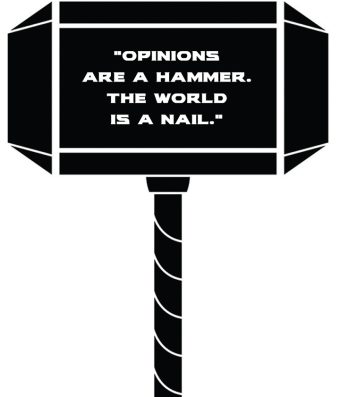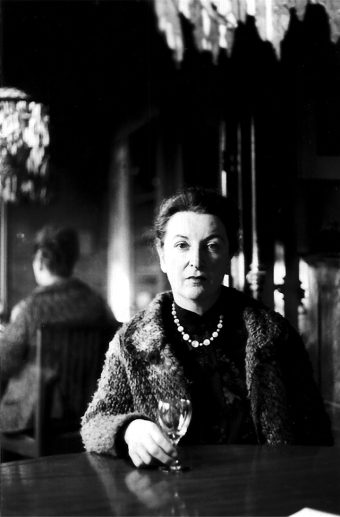
Published on Show Me Mizzou August 25, 2022
Story by T. Kent Jones, BJ ’86
“Kevin Costner has feathers in his hair. And feathers in his head. The Indians should have called him ‘Plays With Camera’."
The movie Dances With Wolves won seven Academy Awards, including best picture and best director, and was hailed by most critics as a modern masterwork, a bold reimagining of the Western genre.
And yet.
It only took three perfectly crafted sentences to reduce Costner’s Oscarfest into a pile of buffalo poop.
You could do that if you were Pauline Kael.
While teenage me had a bit of a crush on Valerie Bertinelli from One Day at a Time, (admit it, so did you), that was weak tea compared to the full-blown case of Farrah Fawcett bedroom-wall-poster love I harbored for The New Yorker magazine’s film critic, a great and powerful Oz who lived a thousand miles away, physically, culturally, intellectually.
From 1968 to 1991, Pauline Kael opined passionately, masterfully and, yes, viciously about New Hollywood’s Raging Bulls: Robert Altman, Francis Ford Coppola, Martin Scorsese, Steven Spielberg. In a business based on the opinions of men, the opinion of this 5-foot-tall woman mattered even more. Ego-bloated producers lay awake dreading the morning her reviews hit the newsstands, and her approval was crucial to the success of such cultural landmarks as The Godfather, Nashville and Raiders of the Lost Ark (more on that later).
My perplexed parents asked me what I wanted for Christmas. I answered, with alarming speed, Taking It All In, a beefy collection of film reviews by a writer whose name sounded vaguely like cabbage. My folks blinked a couple of times, shrugged and bought it for me. At that age, they were just happy I didn’t say Penthouse.
By the light of the Christmas tree, I read Taking It All In and let it tattoo my brain. Here was my turkey, my stuffing, my Red Ryder BB gun.
 Her writing was, and is, a highlight reel of great one-liners:
Her writing was, and is, a highlight reel of great one-liners:
“In the arts, the critic is the only independent source of information. The rest is advertising.”
“This movie is a toupee made up to look like honest baldness.”
“Her only flair is in her nostrils.”
Pauline (I thought of her mononymously, like Cher) could do that all day.
Pauline was Funny. Pauline was Right. Pauline was Powerful. And God help you if she didn’t like you.
It may surprise you to learn that my feelings went unrequited. For some reason, this winner of the National Book Award failed to fall for a spotty teenaged movie nerd living in Jefferson City, Missouri. (I blame logistics. A nationwide network of high-speed light rail might have solved this.)
Still, if her goal was to plant ideas in squishy gray matter like mine, ideas that would bloom into much strange foliage over the course of a lifetime, Pauline Kael succeeded utterly. Possibly too well.
I went off to Mizzou with mislearned lessons from her writings rattling in my skull. This one rose above all: Opinions are a hammer. The world is a nail.

My movie addiction, already well underway worshipping movies like Star Wars and Excalibur, started in earnest one night at Mizzou in 1983.
The Missouri Student Association had curated an excellent film series, and I was headed out to see How to Marry a Millionaire, starring Marilyn Monroe, Lauren Bacall and Betty Grable. I settled into a seat at Brady Commons, all set to watch three dolled-up Manhattan models sing and dance their way into my heart. Then, up on the screen came a series of Japanese characters and haunting black-and-white visions of a ruined temple in the rain.
Marilyn? Lauren? Betty? Hello?
By mistake, I had stumbled into Rashômon, the profound 1950 masterpiece by Akira Kurosawa about the arbitrary nature of Truth. (Google it. See it.)
Only there are no mistakes. Someone, somewhere, somehow meant for me to see that film. Yes, that’s when I started saying “film.” The clouds parted. From that moment on, to quote another popular hit from the ’80s, I was on a mission from God. And what a mission! The years 1981 through 1986 gave us, among many other delights, E.T. and The Evil Dead and Amadeus and Ghostbusters and Stranger Than Paradise and Lost in America and Blood Simple and Blade Runner.
And the wonderful This Is Spinal Tap, which contained a line that summed up so much of my life: “There’s such a fine line between stupid and clever.”
I subscribed to American Film magazine and Film Comment. I bought the Village Voice alt-weekly at Aardvarx to read what critic Jim Hoberman, another hero of mine, had to say. I studied the ads for movies playing in New York City in the Village or the Upper West Side, dreaming of the day I could see the Buster Keaton festival at the Regency or Pier Paolo Pasolini at the Thalia.
Flush with My Incredibly Important Opinions, I started writing, ahem, “film” reviews for the Maneater and the Missourian where my sub-Pauline putdowns could roam free range. About 1984’s Swing Shift:
“Director Jonathan Demme has dived headlong into the look and the romantic gush of his film. The problem is he forgot to come up for air.” “
A precocious 8-year-old with a VCR and a crayon could have come up with this plot.”
How much fun it was to judge things! So much easier than creating something new! That’s what Pauline does, right?
I gorged my ego on culture like the bloated Mr. Creosote from Monty Python’s Meaning of Life. There was always room for one more bite. (“It’s waffair thin.”)
As my screen time and confidence and column inches grew, so did the obnoxious certainty that I Was Always Right. And where do people who are Always Right live? Pauline, I’m home!

After J-School, I moved to New York City where it turns out my dismissive worldview synced with an emerging Gen-X ethos: thrift stores, sludgy indie rock, hip hop, post-disco electronica, video games, a blanket cynicism for boomers and their nonstop self-congratulation. Irony was poured on everything. My orange bowling shirt bought at Leo’s on Ninth Street was surprisingly de rigueur.
The business of feeding My Incredibly Important Opinions began in earnest. I got jobs with magazines, I wrote for New York tabloids, I snarked and judged others for money, and the Old Media was there to give it to me. Validation!
In 1996, Comedy Central took all this to the next level when they shoved news and opinion and comedy into a Mixmaster to create The Daily Show, which hired me as a writer.
Writing jokes! About news! On TV! All without the burden of being an actual journalist. The Daily Show was once perfectly described as “MacNeil/Lehrer for misfits,” and so we were, flinging our info-poop in all directions. Mean-spirited? Juvenile? And your point is?
I even got into the movie critic game co-writing “Out at the Movies,” a flamboyant review segment delivered with maximum irony by Frank DeCaro. Are you watching, Pauline? Call me!
Next came a gig on Air America Radio, more opinions, more comedy, and then a stint writing and performing and opining on The Rachel Maddow Show, with the Gen-X icon and opinioniste extraordinaire.
Money, awards, attention ensued. My Incredibly Important Opinions were being fed and watered and pampered like a 400-pound show poodle. Careful, she bites.
The world had deliberated and decided I Was Right. I wagged my tail. What could possibly go Wrong?
 Back in 1985 when I was playing Robotron at Gunther’s Games on Broadway, how could I have known that staring hypnotized at screens would be my future, your future, everyone’s future?
Back in 1985 when I was playing Robotron at Gunther’s Games on Broadway, how could I have known that staring hypnotized at screens would be my future, your future, everyone’s future?
Turns out all kinds of folks, not just the privileged white guys who got past the Old Media gatekeepers, also had Important Things To Say About Life. Once the internet gave the planet access to an Opinion hammer and an audience, no one would ever put it back in the toolbox.
You know what happened next. The Old Media giants downscaled and digitized and just plain dropped dead, replaced by a billion frogs on a billion lily pads croaking out a billion opinions, jokes, songs, “likes,” fantasies, prejudices, cat videos all day, every day. Ribbit.
What’s a 400-pound show poodle to do? Had I been wrong all this time? What good are my opinions in a swamp like this? What good are anyone’s? Are we all just frogs now?
Ribbit?
“There’s no exhilaration in this dumb, motor excitement.” “It isn’t beautifully made.” “Spielberg fumbles a lot of his action sequences.” “Seeing Raiders is like being put through a Cuisinart — something has been done to us, but not to our benefit.”
Yes, this is what my hero Pauline Kael actually wrote in 1981 about Raiders of the Lost Ark, one of the greatest movies of all time.
Three years later, here’s what she said about the sequel, Indiana Jones and the Temple of Doom, one of the greatest movies of no time. “This is the most sheerly pleasurable physical comedy I’ve seen in years.”
“This kind of storytelling doesn’t have to be heartfelt; it just has to hold your interest (and delight you).”
So, to recap, Pauline Kael dismissed an acknowledged masterpiece and, for millions of fans, their favorite movie ever. Yet despite being at the height of her power and influence, her negative review was unable to stop Raiders from becoming a massive popular and critical hit. The hammer came down and the nail didn’t budge.
She later lavished praise on a movie that many people found heartless and overbearing (Prove me wrong. I’m listening.), including its director, Steven Spielberg.
Are we allowed to say it? Was Pauline Kael … wrong? Is it possible, just this once, that she is the one with feathers in her head?

Yep.
And I have feathers in my head for expecting Pauline Kael, or anyone else, for that matter, to be “right” all the time.
On any given day, everyone has a different story, which is the message of Rashômon by the way. (Google it. See it. Begging you.)
We are neck-deep in Opinions, but opinions change and evolve and even reverse, especially ones written on deadline. What did Elvis Costello say? “Yesterday’s news is tomorrow’s fish and chip paper.”
Pauline’s brilliant championing of movies as art, her palpable excitement, far outweigh any passing thoughts she may have had about any one movie at any one time. Her contribution was never about the one-liners and putdowns I devoured as a teenager. She was in love with the movies, and she wanted you to be in love, too. Passion can be wrong.
So, Pauline had an off day. So what? That just means she was human. Babe Ruth led the majors in strikeouts.
And if Pauline Kael, genius, can be wrong sometimes, that means me, nongenius, can be wrong most of the time.
My Incredibly Important Opinions aren’t and never were. And, I suspect, neither are yours.
Opinion-wise, I’m cutting way back. This show poodle needs to lose a few hundred pounds.
I spoke to her once. People magazine, where I was working at the time, was preparing an issue honoring the 100th anniversary of the city of Hollywood. Reporters like me were calling leading film critics to get their lists of the 10 best and 10 worst films ever made. My job was to call Pauline Kael.
I took three deep breaths and dialed. Ring. Ring.
Hello? She sounded friendly, light.
I explained what we were doing, trying not to hyperventilate or blurt out I LOVE YOU SO MUCH!!! Or, I CAN’T BELIEVE YOU SAID THAT ABOUT RAIDERS!!
She replied, without anger or impatience, “I don’t really participate in those kinds of lists. Thanks anyway.” And she hung up.
She knew. You don’t have to comment on everything.
Pauline Kael died on Sept. 3, 2001, eight days before 9/11.
I have this dream of meeting her in the afterlife. We’re sitting next to each other in a movie theater. I ask her, what are the 10 best movies of all time?
She says, “Well, Raiders of the Lost Ark, obviously. You people really need to learn to take a joke.”




